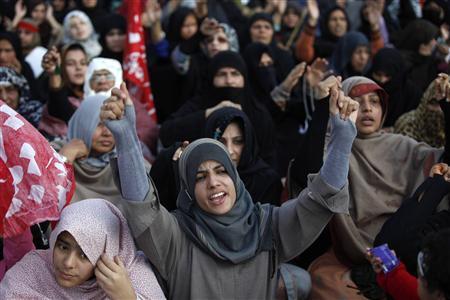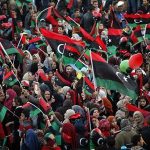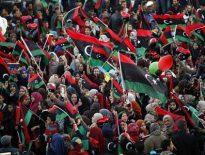(Reuters) – Pakistani Shi’ites furious over a sectarian bombing that killed 85 people protested on Monday, demanding that security forces protect them from hardline Sunni groups.

The attack, near a street market in the southwestern city of Quetta on Saturday, highlighted the government’s failure to crack down on militancy in nuclear-armed Pakistan just a few months before a general election is due.
While the Taliban and al Qaeda remain a major source of instability, Sunni extremists, who regard Shi’ites as non-Muslims, have emerged as another significant security threat.
Shi’ite frustrations with waves of attacks on them have reached boiling point.
In Quetta, some ethnic Shi’ite Hazaras are refusing to bury their dead until the army and security forces go after Lashkar-e-Jhangvi (LeJ), the group which claimed responsibility for the latest bombing.
Around 4,000 men, women and children placed 71 bodies beside a Shi’ite place of worship. Muslim tradition requires that bodies are buried as soon as possible and leaving them above ground is a potent expression of grief and pain.
Protesters chanted “stop killing Shi’ites”.
“We stand firm for our demands of handing over the city to army and carrying out targeted operation against terrorists and their supporters,” said Syed Muhammad Hadi, spokesman for an alliance of Shi’ite groups.
“We will not bury the bodies unless our demands are met.”
The paramilitary Frontier Corps is largely responsible for security in Baluchistan province, of which Quetta is the capital, but Shi’ites say it is unable or unwilling to protect them.
LeJ has stepped up suicide bombings and shootings in a bid to destabilize strategic U.S. ally Pakistan and install a Sunni theocracy, an echo of the strategy that al Qaeda pursued to try and trigger a civil war in Iraq several years ago.
The group was behind a bombing last month in Quetta, near the Afghan border, that killed nearly 100 people.
In Karachi, a strike to protest against the Quetta bloodshed brought Pakistan’s commercial hub to a standstill.
Authorities boosted security as protesters blocked roads, including routes to the airport, disrupted rail services to other parts of the country and torched vehicles.
The roughly 500,000-strong Hazara people in Quetta, who speak a Persian dialect, have distinct features and are an easy target.
The LeJ has had historically close ties to elements in the security forces, who see the group as an ally in any potential war with neighboring India. Security forces deny such links.
(Writing by Michael Georgy; Editing by Alex Richardson)





